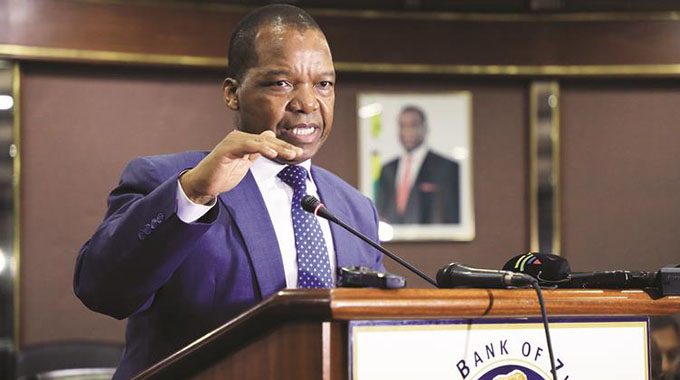New forex rule to oil market steadies rate

Golden Sibanda
Senior Business Reporter
The reintroduction of the 30-day foreign currency liquidation period by the Reserve Bank of Zimbabwe (RBZ), will enhance liquidity and help slow down the run in the exchange rate in the short to medium term, economic analysts have said.
Apparently, the central bank has stepped in to address potentially disastrous economic implications of firms that have been holding on to their foreign currency in protest against the fixed Zimbabwe dollar exchange rate.
RBZ Governor Dr John Mangudya, said this week that the bank’s monetary policy committee (MPC), resolved at its May 22 meeting to reintroduce the 30-day liquidation period, down from 90 days, with effect from July 1, 2020.
Economist Mr Brains Muchemwa said the fast deteriorating exchange rate had jerked the central bank into taking drastic measures to rein in the free-falling rate, including by cutting the exporters forex retention period.
During its MPC meeting, the bank said it had noted and was worried by continued depreciation of the exchange rate on the black market, which was now being used by the private sector, resulting in the recent astronomical increases in prices of goods and services.
The bank’s MPC said it was happy with measures the bank had taken to curb speculative trading in foreign currency using electronic banking platforms, especially by capping mobile money thresholds, imposing daily and monthly transaction limits on electronic platforms.
It was at the RBZ MPC’s May 22 meeting that the resolution to impose a maximum forex retention or holding period of 30 days was adopted in order to enforce the release of hard currency into the market.
Zimbabwe’s currency, characterised by a US dollar dominated multi-currency regime from February 2009 to September 2018, has seen its exchange rate plummet from $2.5 to US$1 since being freely floated on February 22 last year.
The new forex surrender requirement by the RBZ compels exporters to liquidate their surplus or unused foreign currency holdings after 30 days at the prevailing interbank market rate, presently fixed at $25 to US$1.
“The sharp depreciating of the local currency, at the instigation of excessive domestic money supply growth against constrained exports on account of the Covid-19-induced slowdown, has prompted the RBZ to revise the foreign currency retention periods,” Mr Muchemwa noted.
He added that the policy impact on the exchange rate would be positive in the “very short-term” considering that the medium to long term exchange rate outlook remains bearish.
Mr Muchemwa said this was on account of increasing domestic money supply balances emanating from the huge fiscal subsidies that are being directed to ameliorate the worsening socio-economic aspects.
Government recently announced an $18 billion economic recovery and stimulus package to address the negative impact of the Covid-19 global pandemic, which has killed hundreds of thousands and also infected millions others.
Zimbabwe National Chamber of Commerce (ZNCC) chief executive officer Takunda Mugaga said the intention of the central bank in reintroducing the 30-day liquidation period was “very noble”, but risky without other support measures.
He said that the bank’s objective was to maintain constant flow of foreign currency into the market in order to meet the country’s external payments and imports needs.
“But now the risk is that if you have a volatile exchange rate it would be a heavy tax on exporters, I think it would work well with plans to liberalise the exchange rate, which we are hearing about.
“Because if you have a fixed exchange rate and force exporters to surrender foreign currency, it means that you are imposing a very punitive tax on them in the form of exchange loss,” he said.
Mr Mugaga said with in light of plans to liberalise the exchange rate, which the RBZ fixed in March to ensure certainty of pricing during the Covid-19 induced lockdown, the liquidation period would not cause any problems.










Comments